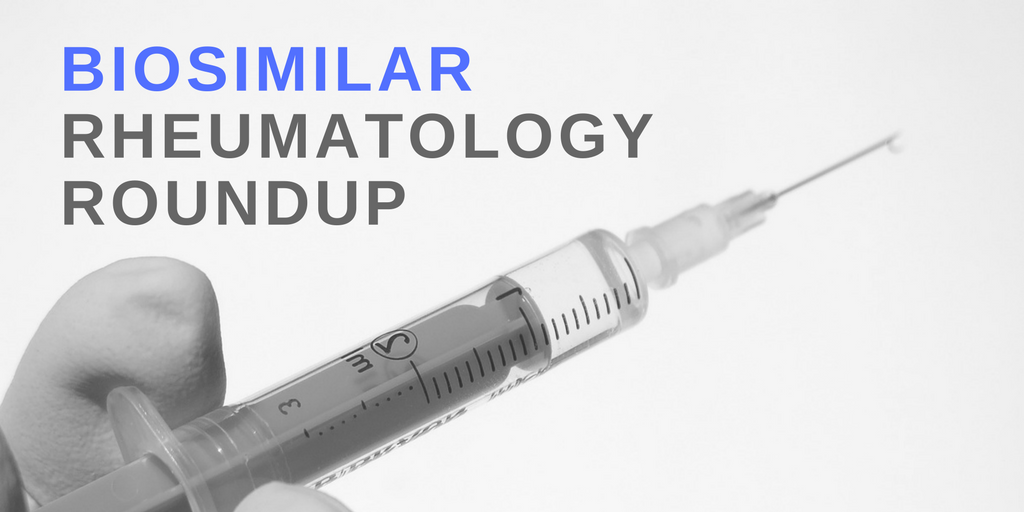- Bone Health
- Immunology
- Hematology
- Respiratory
- Dermatology
- Diabetes
- Gastroenterology
- Neurology
- Oncology
- Ophthalmology
- Rare Disease
- Rheumatology
Biosimilars Rheumatology Roundup: February 2024
During February, the global biosimilar industry saw some progress for rheumatology biosimilars, including the 10th approval for an adalimumab biosimilar in the US, as well as unique results from a clinical trial investigating the impact of adalimumab biosimilars on COVID-19 antibodies.
During February, the global biosimilar industry saw some progress for rheumatology biosimilars, including the 10th approval for an adalimumab biosimilar in the US, as well as unique results from a clinical trial investigating the impact of adalimumab biosimilars on COVID-19 antibodies.

Regulatory Updates
Alvotech has finally secured FDA approval for its adalimumab biosimilar, AVT02 (Simlandi), marking a significant milestone as the first US approval for the company and the 10th biosimilar referencing Humira (adalimumab). It is also the third adalimumab biosimilar to be deemed interchangeable.
Despite previously receiving 2 complete response letters for the biosimilar that were related to Alvotech’s Iceland-based manufacturing facility, the FDA found no issues with the biosimilar candidates themselves or Alvotech's data package. Upon launch, Teva Pharmaceuticals will handle the US commercialization and marketing of Simlandi.
Additionally, the European Medicines Agency’s Committee for Medicinal Products for Human Use (CHMP) recommended approval for Samsung Bioepis’ ustekinumab biosimilar, SB17 (Pyzchiva), in Europe. Upon authorization, it became the second ustekinumab biosimilar for the region. Sandoz was tasked with commercializing Pyzchiva in Europe, the US, Canada, and other regions.
Market Insights and Business News
In its Pharmacy Market Outlook report for Winter 2024, Vizient highlighted the significant impact of biosimilars, with 46 FDA-approved products contributing to 700 million patient days and $23.6 billion in savings since 2015. Despite challenges such as exclusivity protection, biosimilars offered affordable options. Adalimumab biosimilars gained attention in 2023, with 9 launches, competing in 2024.
The report also discussed key therapeutic classes, including autoimmune diseases and oncology, where global spending reached $196 billion in 2022. Recent approvals and developments in dermatology, gastroenterology, and oncology reflected evolving treatment landscapes and financial implications.
In business news, Alvotech settled with Johnson & Johnson, postponing the market entrance of AVT04, an ustekinumab biosimilar candidate referencing Stelara, in Japan, Canada, and the European Union (EU). The settlement requires Alvotech and its partner Teva Pharmaceuticals to postpone AVT04’s launch in these markets until Q1 2024, May 2024, and late July 2024, respectively. The news comes after Alvotech reached a similar settlement in the US, delaying its anticipated launch date from late 2023 to 2025.
Clinical Data Surge
In addition to Samsung Bioepis’ ustekinumab progress, Rani Therapeutics shared new clinical data regarding its oral drug delivery device (RaniPill) that will utilize Celltrion’s ustekinumab biosimilar (CT-P43).
The trial is the third successful phase 1 study assessing RaniPill technology. RT-111, the capsule plus CT-P43, is the first oral monoclonal antibody to achieve significant bioavailability in humans. The study involved 35 participants in Australia, showing good tolerance of RT-111 without serious adverse events and comparable incidence of antidrug antibodies to subcutaneously administered ustekinumab.
A meta-analysis found that switching between biosimilars and reference biologics resulted in similar serious adverse events, deaths, and treatment discontinuations compared to nonswitched patients. Analyzing 44 switch treatment periods from 31 studies on 21 biosimilars, the researchers found no significant differences in safety profiles or immunogenicity-related events. The authors suggested that data-driven reports like theirs would streamline biosimilar development and unlock their full potential.
A retrospective study found that patients receiving adalimumab therapy, whether with the reference product (Humira) or a biosimilar (Idacio), showed decreased antibody levels after COVID-19 vaccination. Conducted in response to concerns about vaccine immunity in autoimmune disease patients, the study compared antibody levels in patients with rheumatoid arthritis, ankylosing spondylitis, and psoriatic arthritis.
While no differences were observed between the originator and biosimilar-treated groups, lower antibody levels were noted in older patients and those treated with methotrexate. Further research is needed to understand the implications of these findings for vaccine effectiveness.
Newsletter
Where clinical, regulatory, and economic perspectives converge—sign up for Center for Biosimilars® emails to get expert insights on emerging treatment paradigms, biosimilar policy, and real-world outcomes that shape patient care.
